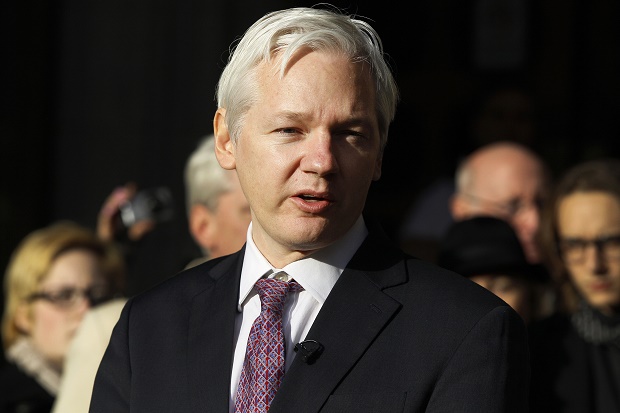Assange hopes to walk out of embassy after UN panel ruling

In this Dec. 5, 2011 file photo, WikiLeaks founder Julian Assange makes a statement to media gathered outside the High Court in London. Assange said Wednesday, Feb. 3, 2016, on WikiLeaks Twitter account that he will accept arrest by British police if a U.N. working group on arbitrary detention decides that the three years he has spent holed up in the Ecuadorean Embassy does not amount to illegal detention. AP File Photo
WikiLeaks founder Julian Assange said he hoped a UN panel’s decision expected on Friday could lead to the end of his confinement in the Ecuadorean embassy in London over a rape allegation in Sweden.
The UN Working Group on Arbitrary Detention (UNWGAD) is expected to declare that his three-and-a-half years stuck in a cramped embassy office amount to illegal detention, the Swedish foreign ministry and Assange’s lawyers said Thursday.
Assange, who has been holed up at the embassy since June 2012 to avoid arrest, said he expects the British police to call off their attempts to detain him if the panel rules in his favor.
READ: Assange says will accept arrest if UN panel rules against him
“Should I prevail and the state parties be found to have acted unlawfully, I expect the immediate return of my passport and the termination of further attempts to arrest me,” the Australian national said in a statement.
Article continues after this advertisementBut Swedish prosecutors said the ruling had no impact on its investigation into a 2010 rape allegation against Assange—which he denies—and London said it would have to arrest him as long as a European warrant was in force.
Article continues after this advertisementAssange fears that, if detained, he could be extradited to the US be tried over the publication of hundreds of thousands of classified documents.
WikiLeaks filed a complaint against Sweden and Britain to the UN group in September 2014, claiming his confinement in the embassy was unlawful.
The Swedish foreign ministry said the government had received a copy of the panel’s conclusions, which a spokeswoman told AFP “has come to another conclusion than Swedish judicial authorities.”
Founded by Assange in 2006, WikiLeaks has infuriated the United States by releasing some 500,000 secret military files on the wars in Afghanistan and Iraq and 250,000 diplomatic cables.
The main source of the leaks, US Army soldier Chelsea Manning, was sentenced to 35 years in prison for breaches of the Espionage Act.
The UN group’s report is due to be published at 0800 GMT. Assange’s legal team will hold a press conference in London at which the he “will be present” on Friday at 1200 GMT, WikiLeaks said in a statement, without detailing how.
‘We were right’
Christophe Marchand, one of his lawyers from the Brussels-based law firm Jus Cogens, told AFP he hoped Britain would “endeavour to free Assange” after the ruling.
After it came to light that the UN panel is expected to rule in Assange’s favor, Ecuadorean President Rafael Correa told a news conference it “shows we were right, after so many years.”
READ: Ecuador president hails UN’s Assange ruling
“But who is going to compensate the harm that has been done to Julian Assange and to Ecuador?” Correa asked.
“Do you know how much it costs to maintain security at the embassy?”
As news of the latest development filtered through, British fashion designer Vivienne Westwood visited Assange at the embassy in London’s elite Knightsbridge district.
A small group of supporters also gathered outside the building, holding up signs reading: “Free Assange” and “The Truth Must Never Be Silenced.”
Rulings by the UN group are not legally binding, although the Justice for Assange support group claimed it has influenced the release of prominent figures including Myanmar’s Aung San Suu Kyi and former Maldives president Mohamed Nasheed.
Swedish prosecutors said Thursday the panel’s ruling “has no formal significance for the ongoing investigation under Swedish law.”
Assange sought refuge in the embassy in June 2012 over fears he could be extradited and Ecuador granted him asylum.
But he has faced immediate arrest if he stepped onto British soil as police maintained a 24-hour guard outside the embassy until October last year, when it scrapped it in favor of a “covert plan.”
The British government denied that Assange was ever arbitrarily detained, saying he was instead “voluntarily avoiding lawful arrest.”
“An allegation of rape is still outstanding and a European Arrest Warrant in place, so the UK continues to have a legal obligation to extradite Mr Assange to Sweden,” a spokesman said.